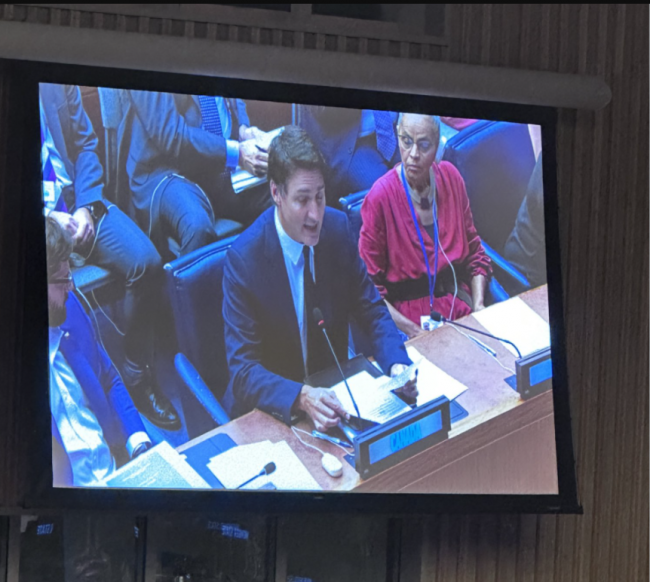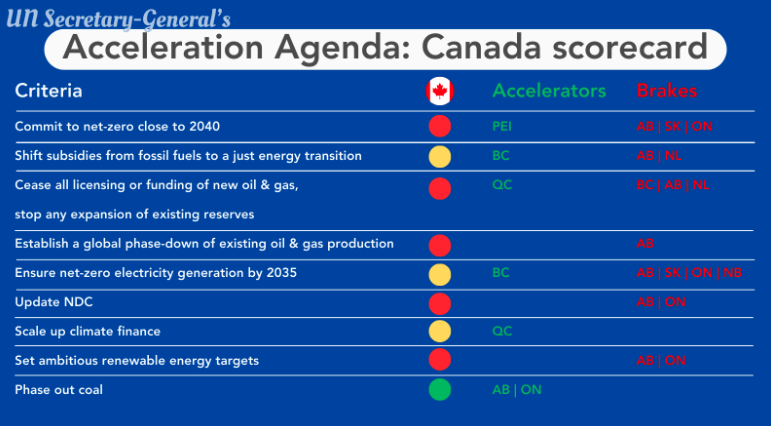Articles Menu

Sept. 21, 2023
Speaking at the Climate Ambition Summit in New York City on Wednesday, Prime Minister Justin Trudeau was grilled for Canada’s massive oil and gas expansion at a time when climate science demands fossil fuels be rapidly phased out.
United Nations Under-Secretary-General Melissa Fleming invited Trudeau to speak but before he did, she noted Canada was one of the largest expanders of fossil fuels last year and asked what Canada is doing to align with the Acceleration Agenda — a series of steps rich countries should take, which the UN says can rescue the Paris Agreement from failing like so many climate accords of the past.
The Acceleration Agenda calls for rich countries to set net-zero by 2040 targets, phase out coal power by 2030, end fossil fuel subsidies, set ambitious renewable energy targets, implement fair, equitable and just energy transitions, and for new standards of climate justice to guide decision-making.
Trudeau said he agreed with UN Secretary-General António Guterres’ call for accelerated action, not just “because the science demands it, but because of the economic opportunity.”
“Climate policy is economic policy,” he said. “As we move forward, we will continue to increase our ambition at every level,” he added.
Elsewhere in his address, Trudeau confirmed his government’s proposed cap on oil and gas sector emissions would have a “framework” finished by the end of 2023, a little over two years since he first pledged the regulations. He also announced forthcoming draft regulations to cap methane pollution, which he said would exceed Ottawa’s target of 75 per cent reductions from 2012 levels by 2030. And he said Canada was allocating $700 million to the International Monetary Fund’s Poverty Reduction and Growth Trust, to be tapped by low-income countries.
Trudeau’s speech was met with fierce opposition from climate and Indigenous rights advocates.
“When at home in so-called Canada, Trudeau provides ample lip service to nurturing relationships with Indigenous people, yet when given the opportunity to speak in international spaces, he reduces climate action to economic opportunities — and fails to acknowledge our rights at all,” said Indigenous Climate Action executive director Eriel Tchekwie Deranger in a statement.
Global policy manager with Oil Change International Romain Ioualalen said rich countries like Canada were given an opportunity to demonstrate their commitment to the Paris Agreement, but “instead we saw cowardice and a staggering failure of climate leadership.”
“The U.S., Canada, Australia, the U.K., and Norway, responsible for a majority of planned oil and gas extraction, either arrived empty-handed or failed to attend altogether," said @Rlalen with @PriceofOil #ClimateAmbitionSummit - Twitter
"The U.S., Canada, Australia, the U.K., and Norway, responsible for a majority of planned oil and gas extraction, either arrived empty-handed or failed to attend altogether,” he said in a statement. “This is a slap in the face of the more than 600,000 people who marched on all [seven] continents last weekend.”
A recent study from Oil Change International found Canada is on track to be the second-largest fossil fuel expander, behind the United States, by 2050. On its own, Canada’s planned fossil fuel expansion represents 10 per cent of the world’s expansion plans, creating the equivalent greenhouse gas emissions of 117 coal plants run for decades.

Ahead of the summit, Climate Action Network Canada analyzed how close the federal and provincial governments are to reaching the Acceleration Agenda’s targets, revealing the jurisdictions furthest from the goals. While some provinces like British Columbia, Quebec and Prince Edward Island already meet some of the goals, others like Alberta, Saskatchewan, Ontario and Newfoundland and Labrador remain far off-track.
It’s “not solely the federal government,” said Climate Action Network Canada senior international policy analyst Pratishtha Singh. “Provincial government co-operation [is] really needed for us to meet the goals of the Paris Agreement.”
Provincial co-operation appears unlikely. Alberta Premier Danielle Smith recently threatened to upend a working group between her province and the federal government if Ottawa advanced a cap on oil and gas sector emissions or new policies aimed at methane pollution — two policies Trudeau confirmed he plans to introduce shortly.
After a blistering summer of unprecedented heat waves, Guterres is desperate for climate action and is using this week’s summit to up the pressure on rich countries like Canada ahead of tense climate talks at the UN’s annual climate negotiations later this year at COP28.
“Humanity has opened the gates to hell,” Guterres told world leaders Wednesday. Without rapidly phasing out fossil fuels, the world is on a path to warming of 2.8 C — a “dangerous and unstable world,” he said.
“If we are to meet the 1.5-degree limit and protect ourselves from climate extremes, climate champions, particularly in the developing world, need solidarity,” Guterres said. Solidarity, he explained, means financial support and for rich countries to cut greenhouse gas emissions. “We must make up time lost to foot-dragging, arm-twisting and the naked greed of entrenched interests raking in billions from fossil fuels.”